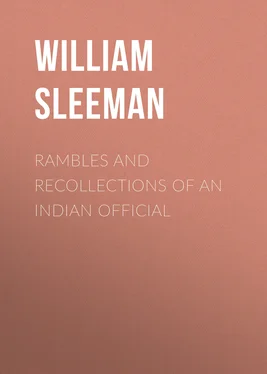William Sleeman - Rambles and Recollections of an Indian Official
Здесь есть возможность читать онлайн «William Sleeman - Rambles and Recollections of an Indian Official» — ознакомительный отрывок электронной книги совершенно бесплатно, а после прочтения отрывка купить полную версию. В некоторых случаях можно слушать аудио, скачать через торрент в формате fb2 и присутствует краткое содержание. Жанр: Путешествия и география, История, foreign_edu, foreign_antique, foreign_prose, на английском языке. Описание произведения, (предисловие) а так же отзывы посетителей доступны на портале библиотеки ЛибКат.
- Название:Rambles and Recollections of an Indian Official
- Автор:
- Жанр:
- Год:неизвестен
- ISBN:нет данных
- Рейтинг книги:4 / 5. Голосов: 1
-
Избранное:Добавить в избранное
- Отзывы:
-
Ваша оценка:
- 80
- 1
- 2
- 3
- 4
- 5
Rambles and Recollections of an Indian Official: краткое содержание, описание и аннотация
Предлагаем к чтению аннотацию, описание, краткое содержание или предисловие (зависит от того, что написал сам автор книги «Rambles and Recollections of an Indian Official»). Если вы не нашли необходимую информацию о книге — напишите в комментариях, мы постараемся отыскать её.
Rambles and Recollections of an Indian Official — читать онлайн ознакомительный отрывок
Ниже представлен текст книги, разбитый по страницам. Система сохранения места последней прочитанной страницы, позволяет с удобством читать онлайн бесплатно книгу «Rambles and Recollections of an Indian Official», без необходимости каждый раз заново искать на чём Вы остановились. Поставьте закладку, и сможете в любой момент перейти на страницу, на которой закончили чтение.
Интервал:
Закладка:
A complicated religious code, like that of the Hindoos, is to the priest what a complicated civil code, like that of the English, is to the lawyers. A Hindoo can do nothing without consulting his priest, and an Englishman can do nothing without consulting his lawyer.
CHAPTER 26
On the 11th 331we came on twelve miles to the town of Bamhaurī, whence extends to the south-west a ridge of high and bare quartz hills, towering above all others, curling and foaming at the top, like a wave ready to burst, when suddenly arrested by the hand of Omnipotence, and turned into white stone. The soil all the way is wretchedly poor in quality, being formed of the detritus of syenitic and quartz rocks, and very thin. Bamhaurī is a nice little town, 332beautifully situated on the bank of a fine lake, the waters of which preserved during the late famine the population of this and six other small towns, which are situated near its borders, and have their lands irrigated from it. Besides water for their fields, this lake yielded the people abundance of water-chestnuts 333and fish. In the driest season the water has been found sufficient to supply the wants of all the people of those towns and villages, and those of all the country around, as far as the people can avail themselves of it.
This large lake is formed by an artificial bank or wall at the south-east end, which rests one arm upon the high range of quartz rocks, which run along its south-west side for several miles, looking down into the clear deep water, and forming a beautiful landscape.
From this pretty town, Ludhaura, where the great marriage had lately taken place, was in sight, and only four miles distant. 334It was, I learnt, the residence of the present Rājā of Orchhā, before the death of his brother called him to the throne. Many people were returning from the ceremonies of the marriage of 'sālagrām' with 'Tulasī'; who told me that the concourse had been immense—at least one hundred and fifty thousand; and that the Rājā had feasted them all for four days during the progress of the ceremonies, but that they were obliged to defray their expenses going and coming, except when they came by special invitation to do honour to the occasion, as in the case of my little friend the Sāgar high priest, Jānkī Sewak. They told me that they called this festival the 'Dhanuk jag'; 335and that Janakrāj, the father of Sītā, had in his possession the 'dhanuk', or immortal bow of Parasrām, the sixth incarnation of Vishnu, with which he exterminated all the Kshatriyas, or original military class of India, and which required no less than four thousand men to raise it on one end. 336The prince offered his daughter in marriage to any man who should bend this bow. Hundreds of heroes and demigods aspired to the hand of the fair Sītā, and essayed to bend the bow; but all in vain, till young Rām, the seventh incarnation of Vishnu, 337then a lad of only ten years of age, came; and at the touch of his great toe the bow flew into a thousand pieces, which are supposed to have been all taken up into heaven. Sītā became the wife of Rām; and the popular poem of the Rāmāyana describes the abduction of the heroine by the monster king of Ceylon, Rāvana, and her recovery by means of the monkey general Hanumān. Every word of this poem, the people assured me, was written, if not by the hand of the Deity himself, at least by his inspiration, which was the same thing, and it must, consequently, be true. 338Ninety-nine out of a hundred among the Hindoos implicitly believe, not only every word of this poem, but every word of every poem that has ever been written in Sanskrit. If you ask a man whether he really believes any very egregious absurdity quoted from these books, he replies with the greatest naïveté in the world, 'Is it not written in the book; and how should it be there written if not true?' The Hindoo religion reposes upon an entire prostration of mind, that continual and habitual surrender of the reasoning faculties, which we are accustomed to make occasionally. While engaged at the theatre, or in the perusal of works of fiction, we allow the scenes, characters, and incidents to pass before 'our mind's eye', and move our feelings, without asking, or stopping a moment to ask, whether they are real or true. There is only this difference that, with people of education among us, even in such short intervals of illusion or abandon, any extravagance in acting, or flagrant improbability in the fiction, destroys the charm, breaks the spell by which we have been so mysteriously bound, stops the smooth current of sympathetic emotion, and restores us to reason and to the realities of ordinary life. With the Hindoos, on the contrary, the greater the improbability, the more monstrous and preposterous the fiction, the greater is the charm it has over their minds; 339and the greater their learning in the Sanskrit the more are they under the influence of this charm. Believing all to be written by the Deity, or by his inspiration, and the men and things of former days to have been very different from the men and things of the present day, and the heroes of these fables to have been demigods, or people endowed with powers far superior to those of the ordinary men of their own day, the analogies of nature are never for a moment considered; nor do questions of probability, or possibility, according to those analogies, ever obtrude to dispel the charm with which they are so pleasingly bound. They go on through life reading and talking of these monstrous fictions, which shock the taste and understanding of other nations, without once questioning the truth of one single incident, or hearing it questioned. There was a time, and that not very distant, when it was the same in England, and in every other European nation; and there are, I am afraid, some parts of Europe where it is so still. But the Hindoo faith, so far as religious questions are concerned, is not more capacious or absurd than that of the Greeks and Romans in the days of Socrates and Cicero—the only difference is, that among the Hindoos a greater number of the questions which interest mankind are brought under the head of religion.
There is nothing in the Hindoos more absurd than the piety of Tiberius in offering up sacrifices in the temple, and before the image of Augustus; while he was solicited by all the great cities of the empire to suffer temples to be built and sacrifices to be made to himself while still living; or than Alexander's attempt to make a goddess of his mother while yet alive, that he might feel the more secure of being made a god himself after his death. 340In all religions there are points at which the professors declare that reason must stop, and cease to be a guide to faith. The pious man thinks that all which he cannot comprehend or reconcile to reason in his own religion must be above it. The superstitions of the people of India will diminish before the spread of science, art, and literature; and good works of history and fiction would, I think, make far greater havoc among these superstitions even than good works in any of the sciences, save the physical, such as astronomy, chemistry, &c. 341
In the evening we went out with the intention of making an excursion of the lake, in boats that had been prepared for our reception by tying three or four fishing canoes together; 342but, on reaching the ridge of quartz hills which runs along the south-east side, we preferred moving along its summit to entering the boats. The prospect on either side of this ridge was truly beautiful. A noble sheet of clear water, about four miles long by two broad, on our right; and on our left a no less noble sheet of rich wheat cultivation, irrigated from the lake by drains passing between small breaks in the ridges of the hills. The Persian wheel is used to raise the water. 343This sheet of rich cultivation is beautifully studded with mango groves and fields of sugar-cane. The lake is almost double the size of that of Sāgar, and the idea of its great utility for purposes of irrigation made it appear to me far more beautiful; but my little friend the Sarīmant, who accompanied us in our walk, said that 'it could not be so handsome, since it had not a fine city and castle on two sides, and a fine Government house on the third'.
Читать дальшеИнтервал:
Закладка:
Похожие книги на «Rambles and Recollections of an Indian Official»
Представляем Вашему вниманию похожие книги на «Rambles and Recollections of an Indian Official» списком для выбора. Мы отобрали схожую по названию и смыслу литературу в надежде предоставить читателям больше вариантов отыскать новые, интересные, ещё непрочитанные произведения.
Обсуждение, отзывы о книге «Rambles and Recollections of an Indian Official» и просто собственные мнения читателей. Оставьте ваши комментарии, напишите, что Вы думаете о произведении, его смысле или главных героях. Укажите что конкретно понравилось, а что нет, и почему Вы так считаете.












